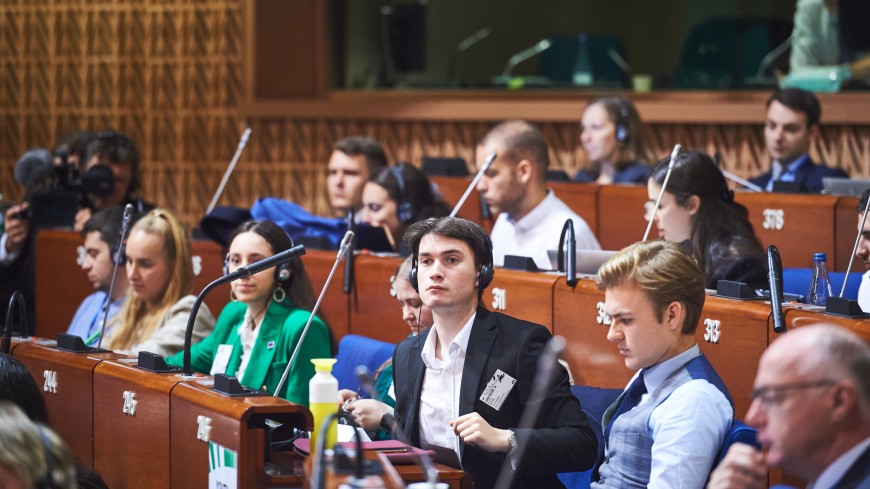With 1,300 participants in various European countries and more than 10,000 people indirectly involved, the youth delegates' projects made an impression due to the maturity and seriousness of their approaches, but also by the enthusiasm and spirit of innovation that contaminated their elders. Marc Cools (Belgium, ILDG), who urged his colleagues to seriously consider integrating young people into the official bodies of their municipalities on the same principle as at the Congress, was delighted. Whether in the form of research, presentations of Congress and Council of Europe activities, workshops or various events, all the projects have popularised the work of the Congress in an unprecedented way and inspired future political, educational or communication vocations in the field of human rights and participatory democracy.
It is hard not to identify with the sensitive and humanistic approach of the project presented by youth delegate Ioana Livadariu (Romania) who created an experimental programme teaching kindergarten children the joy of choice. "Education starts on day one, not at 18," she said, explaining that her three-day project, carried out in kindergarten in Bucharest, could serve as an example for other schools that would like to get children used to voting, making decisions by consensus and working in teams. Introducing children at an early age to a wide range of values that underpin democracy, such as freedom of expression, equality and cooperation, inclusion and solidarity, could yield amazing results and significantly increase the participation of young people in local and regional democratic bodies in the future.
For this to happen, as youth delegate Andžela Rudzīte (Latvia) reminded us, progress should be made in the allocation of specific budgets. Her research on Youth Participation in Municipalities in her country showed that only 23% of Latvian municipalities have an explicit budget for youth participation in local democracy. Sent to the Ministry of Education, her work can help national authorities to improve the implementation of the revised European Charter which provides for the participation of young people in decision-making at local and regional level.
For this to happen, as youth delegate Andžela Rudzīte (Latvia) reminded us, progress must be made in the allocation of specific budgets. Her research on Youth Participation in Municipalities in her country showed that only 23% of Latvian municipalities have an explicit budget for youth participation in local democracy. Her work, which was sent to the Ministry of Education, can help national authorities to improve the implementation of the revised European Charter which provides for the participation of young people in decision-making at local and regional level.
Elena Manso Palao's (Spain) Voice & Vote project impressed delegates precisely because of its determination to explore three different ways of involving young people in Madrid and European politics: the institutional route, where it took "a lot of tenacity" to get the go-ahead from Madrid City Council; the media route, which very quickly generated the enthusiasm of a radio station; and finally, the presentation of the activities of the Congress and its youth delegates to the students of Juan Carlos University. The weekly broadcast of a programme on the regional branch of one of Spain's most listened-to radio stations - Cadena SER, inviting young people to share their experiences of participation in local politics, was a great success for Voice & Vote. Not to mention the fact that its participants stayed in touch and will continue to collaborate. This was also the case for the 130 participants of the Conference on Good Governance, Human Rights Protection and Youth Participation in Europe, held in Thessaloniki on 23 September 2022. Organised by youth delegate Prodromos Tzounopoulos in co-operation with the University of Macedonia, the UN, Unesco and the Youth Club of Thessaloniki, it reached hundreds of people who became familiar with the work of the Council of Europe and the Congress. Indeed, one of the recommendations made by the youth delegates during the debate was to improve the visibility of the Congress and its programme with youth delegates, which is much less known to the general public than the similar UN programme.
"If you are the leaders of tomorrow, I feel reassured", concluded Jose Benlloch Fernandez (Spain, SOC/G/PD), echoing the words of many of his colleagues who expressed their admiration and unconditional support for the impressive work of the Congress' youth delegates.
Since 2014, the Congress has invited young people aged 18 to 30 from different backgrounds to participate in its sessions, with each of the 46 national delegations hosting a youth delegate for one calendar year. During the 43rd Congress session, the 2022 generation of young delegates presented in the hemicycle the 21 projects carried out in the field at the end of their mandate. This was a very successful outcome which is a testament to the success of the youth integration policy implemented by the Congress.
Summary of youth delegates projects
****
43rd Session
Agenda – Web file – Multimedia (Live webcasts, interviews, videos and photo)




